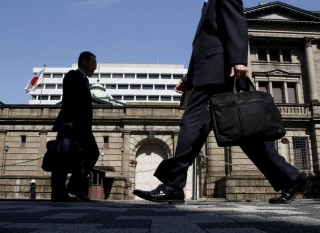Loading
Search
▼ Poll: Firms See No Tightening at BOJ Until 2019 or Beyond
- Category:Event
TOKYO (Reuters) — Three-quarters of companies say the Bank of Japan needs to exit from its super-easy monetary policy but most do not see that happening until next year or beyond, a Reuters poll found.
The results of the monthly Reuters Corporate Survey come as central bank Gov. Haruhiko Kuroda — reappointed for a second term — and his two new deputies are set to begin their terms, aiming to spur economic growth and drive inflation to the central bank’s so-far elusive target of 2 percent.
With inflation struggling to accelerate even after five years of Kuroda’s aggressive monetary stimulus, the central bank is in no mood to rush to exit, although the governor flagged the possibility if the inflation target is met in fiscal 2019 — a remark he tempered later.
The BOJ has reduced the amount of government bonds it buys under its super-easy policy, in what traders call “stealth tapering.” When exiting, market sources said they would expect the central bank to raise its 10-year bond yield target, although most of them predict no such move this year.
Of some 240 companies that responded to the survey, 74 percent agreed on the need for the BOJ to pull back from its easy monetary policy and two-thirds expected the BOJ’s next move to be a tightening of policy.
However, nearly three-quarters of firms did not expect BOJ action this year.
The biggest portion of respondents, at 38 percent, did not expect the BOJ to change policy until sometime in 2020 or later. Most analysts predicted the central bank would keep the long-term bond yield target at zero percent throughout the year, a Reuters poll showed last month.
“I was a bit surprised that 38 percent of companies saw no BOJ action by 2020 or beyond. This shows how companies are unconvinced about sustainability of the economy’s momentum,” said Masaki Kuwahara, senior economist at Nomura Securities, who reviewed the survey results.
“They want the BOJ to go slow in tightening policy or even hope for further easing if necessary.”
The strong yen and higher long-term rates, which determine corporate borrowing costs, were cited as sources of concern when the BOJ does finally start to curb its stimulus.
“Corporate profits are solid and the economy is in good shape now. The BOJ must head to the exit in order to make some room for future easing, while being ready for the slowdown that will cause,” a manager at an electrical appliance maker wrote.
The monthly poll, conducted March 1-15 on behalf of Reuters by Nikkei Research, polled 542 big and medium-sized firms with managers responding on condition of anonymity.
The results of the monthly Reuters Corporate Survey come as central bank Gov. Haruhiko Kuroda — reappointed for a second term — and his two new deputies are set to begin their terms, aiming to spur economic growth and drive inflation to the central bank’s so-far elusive target of 2 percent.
With inflation struggling to accelerate even after five years of Kuroda’s aggressive monetary stimulus, the central bank is in no mood to rush to exit, although the governor flagged the possibility if the inflation target is met in fiscal 2019 — a remark he tempered later.
The BOJ has reduced the amount of government bonds it buys under its super-easy policy, in what traders call “stealth tapering.” When exiting, market sources said they would expect the central bank to raise its 10-year bond yield target, although most of them predict no such move this year.
Of some 240 companies that responded to the survey, 74 percent agreed on the need for the BOJ to pull back from its easy monetary policy and two-thirds expected the BOJ’s next move to be a tightening of policy.
However, nearly three-quarters of firms did not expect BOJ action this year.
The biggest portion of respondents, at 38 percent, did not expect the BOJ to change policy until sometime in 2020 or later. Most analysts predicted the central bank would keep the long-term bond yield target at zero percent throughout the year, a Reuters poll showed last month.
“I was a bit surprised that 38 percent of companies saw no BOJ action by 2020 or beyond. This shows how companies are unconvinced about sustainability of the economy’s momentum,” said Masaki Kuwahara, senior economist at Nomura Securities, who reviewed the survey results.
“They want the BOJ to go slow in tightening policy or even hope for further easing if necessary.”
The strong yen and higher long-term rates, which determine corporate borrowing costs, were cited as sources of concern when the BOJ does finally start to curb its stimulus.
“Corporate profits are solid and the economy is in good shape now. The BOJ must head to the exit in order to make some room for future easing, while being ready for the slowdown that will cause,” a manager at an electrical appliance maker wrote.
The monthly poll, conducted March 1-15 on behalf of Reuters by Nikkei Research, polled 542 big and medium-sized firms with managers responding on condition of anonymity.
- March 24, 2018
- Comment (0)
- Trackback(0)


